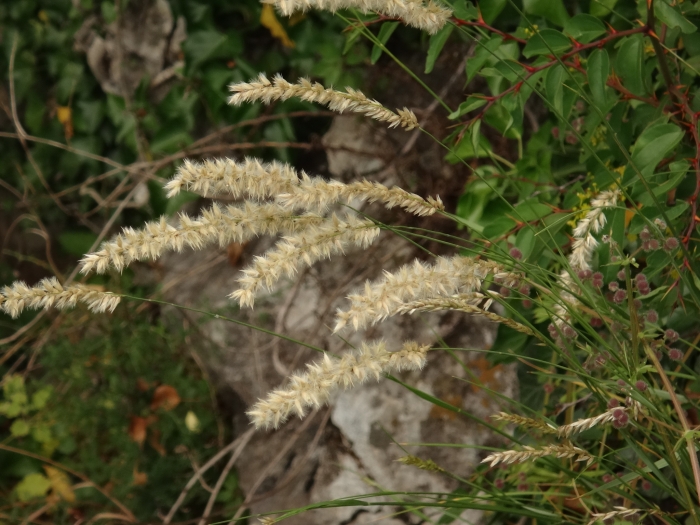Hairy Melic
(Melica ciliata)
Hairy Melic (Melica ciliata)
/
/

Christian Berg
CC BY 4.0
Image By:
Christian Berg
Recorded By:
Copyright:
CC BY 4.0
Copyright Notice:
Photo by: Christian Berg | License Type: CC BY 4.0 | License URL: http://creativecommons.org/licenses/by/4.0/ | Rights Holder: Christian Berg | Publisher: iNaturalist | Date Created: 2021-06-06T13:59:20-07:00 |

























Estimated Native Range
Summary
Melica ciliata, commonly known as hairy melic, is a tufted deciduous perennial grass native to a range of habitats including open woodlands, grasslands, and rocky slopes in Europe, North Africa, and temperate Asia. It has also been introduced to South Australia. This species typically grows up to 39 inches tall and features flat, stiff leaves. The plant is characterized by its contracted panicles that can reach up to 7.9 inches long, bearing spikelets that are silky and hair-like, giving the grass its common name. Flowering occurs from late spring to early summer, and the flowers are not particularly showy but add a delicate texture to the landscape.
Hairy melic is valued for its ornamental grassy foliage and its ability to thrive in a variety of garden settings. It is often used in naturalistic plantings, meadow gardens, and as a border accent. This grass prefers well-drained soils and can tolerate a range of light conditions from full sun to partial shade. It is generally low maintenance, requiring minimal watering once established. Hairy melic is not known for serious pest or disease problems, making it a reliable choice for gardeners. However, it may self-seed and spread in ideal conditions, so management may be necessary to prevent unwanted naturalization.CC BY-SA 4.0
Hairy melic is valued for its ornamental grassy foliage and its ability to thrive in a variety of garden settings. It is often used in naturalistic plantings, meadow gardens, and as a border accent. This grass prefers well-drained soils and can tolerate a range of light conditions from full sun to partial shade. It is generally low maintenance, requiring minimal watering once established. Hairy melic is not known for serious pest or disease problems, making it a reliable choice for gardeners. However, it may self-seed and spread in ideal conditions, so management may be necessary to prevent unwanted naturalization.CC BY-SA 4.0
Plant Description
- Plant Type: Grass
- Height: 0.5-1.5 feet
- Width: 0.75-1.25 feet
- Growth Rate: Moderate
- Flower Color: N/A
- Flowering Season: Spring, Summer
- Leaf Retention: Deciduous
Growth Requirements
- Sun: Full Sun, Part Shade
- Water: Medium
- Drainage: Medium
Common Uses
Border Plant, Low Maintenance
Natural Habitat
Native to open woodlands, grasslands, and rocky slopes in Europe, North Africa, and temperate Asia
Other Names
Common Names: Silky Melic, Rough melic, Ciliate Melic, Hairy Melic, Silky-Spike Melic
Scientific Names: , Melica ciliata, Arundo ciliata, Beckeria ciliata, Beckeria ciliata, Beckeria ciliata, Beckeria montana, Claudia ciliata, Dalucum ciliatum, Lasiagrostis variegata
GBIF Accepted Name: